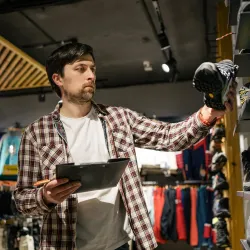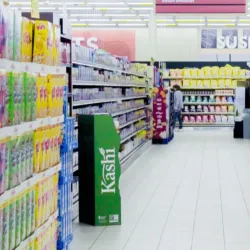Industry Knowledge
Trouble in Transit: Traversing the Travel Industry Today
From the industry’s labor crunch to the crucial role of customer experience—what kind of challenges and trends do travel and hospitality players need to navigate?
With departure gates and international borders re-opening, we’re all slowly rediscovering what it’s like to travel. From constant re-bookings, shifting mask requirements, to just being physically out of shape from what seemed like ages of staying at home—traveling just isn’t like what we’re used to anymore. As all of these changes unfold, identifying and analyzing the new trends, issues, and opportunities are surely going to be key for businesses in the sector to get back on track.
I, together with Senior Director for Client Services Bunny Kairuz Rashdi, and Division Vice President for Client Services Toriah Van Heuvelen recently rendezvoused at the company’s regular Fireside Chat to discuss this timely topic. Entitled “Trouble in Transit: Traversing the Travel Industry Today,” the online forum tackled today’s most pressing travel and hospitality topics—from the labor crunch to the crucial role that customer experience will play.
2022: Travel Strikes Back
If there’s one thing about the industry that’s clear, it’s that it’s definitely back—with a vengeance. According to Statista, leading online travel agencies have been seeing an increase in revenue since early last year.1 “It's safe to assume that there is a surge for travel for several reasons in 2022,” Rashdi explained. “Some preliminary data from our partners and some of the carriers that we work with are showing an increase in re-bookings, from 2021 to 2022.”
This increase was tied to canceled pre-pandemic travel plans, according to Rashdi: “Some partners even see a 10% increase from 2021 to 2022 in the amount of re-bookings versus new bookings. The pandemic hit us [in the] early part of 2020. And for travelers, as we know, any scheduled bookings within that year had to be put on hold. Most carrier providers allow two years for you to rebook. So the two years is hitting us now. A lot of travelers are availing of the vouchers or making sure they meet the deadline or allowance for them to rebook. That's what we're seeing now.”
She went on to say that whether rebooking or not, 2022 is still the revenge year for travel. “2022 seems to be the burst in travelers. We see longer security wait times. We see longer wait times when you call [customer] services, when you're sending an email or a potential chat, and even increased baggage inquiries.”
From Daydreams to Bookings
With the new surge of travel come new trends, one of the most relevant probably being the top destinations to visit right now. “Dubai, London, Cancun, Indonesia, Greece, Turkey, Cabo and Italy. Cabo is actually one of my favorites in that list,” Van Huevelen shared. These locations, however, weren’t chosen by tourists on a whim or by chance; she added that these came about strategically: “I think the attraction to these places, though, is people being pretty inventive and creative with their marketing, between cheaper fares higher points, to travel to certain locations, and just deals and just curating these experiences.”
Rashdi followed this up by sharing a peculiar trend: “So there's a new philanthropic trend that has been identified by the impact of the pandemic. Cities or countries who rely on tourism for their economic survival—people are wanting to go there and see what they can do from an outreach or volunteer perspective. You're seeing a lot more of outreach type of vacation destinations. There's an elephant sanctuary in Chiang Mai that now has a two-year waitlist, as opposed to a six-month waitlist three years ago.”
All Roads Lead to CX

Going even deeper into travel preferences and trends—particularly for the hospitality sector—Van Huevelen emphasized the importance of catering to guests’ specific needs in 2022: “What's important is people having curated space for their guests. So “bleisure” is the new word for both business and leisure … I think a lot of people are either extending work travel or coming in early.” Post-pandemic, it’s all about the details. “Having something simple, like a yoga mat and maybe some light weights in your room… providing those local cultural experiences that are super seamless to book… that makes it one extra thing that the traveler doesn't have to do,” she explained.
Clearly, customer experience is going to be a key factor for the travel sector in 2022 and beyond.
Stats will say 64% of customers are more likely to recommend a brand based on experience. Customer profile segmentation has never been more important
Van Huevelen
To further illustrate this, she recounted an unforgettable experience she had in a recent trip where her hotel personalized everything from the note in the bouquet of flowers, to re-serving the specific type of cookie they noticed she was eating more of.
In a similar vein, Rashdi highlighted the need for emotional sensitivity, as well: “Let's not forget that this industry is emotional… we don't know if the traveler saved several months of their salary for that honeymoon, or is traveling in the midst of a personal tragedy, or is in the process of going for a final interview for the career of choice of their life… I think we tend to forget or we may get caught up in the transactional process as providers, not really realizing that there are emotions on every PNR (Passenger Name Record) that we book or fix.”
A Slight Turbulence Ahead
We also discussed the current issues shaking the industry. One major challenge, Rashdi identified, is the sector’s on-going labor crunch: “The big piece, I think, is the shortage of workforce when it comes to new hiring, and then the challenges that we face when it comes to onboarding and getting a new hire really proficient and able to assist.” In fact, The World Travel & Tourism Council believes that 412,000 jobs in the US will remain vacant for 2022.2
She also mentioned the lack of adaptation in the space: “There’s a significant amount of repeated tasks in the industry. Some of our partners are still on a legacy type of interface, versus something cloud or something more automated. At TaskUs, we see this as an opportunity to really discover and see what can be digitized.”
This will be crucial point of improvement as 66% of global travel and tourism sales took place online, according to Statista.3 Furthermore, airline carriers will surely benefit from streamlining their system; the Department of Transportation reported a whopping 321.5% in consumer complaints in April 2022 (5,079) versus before the pandemic in April 2019 (1,205).
Trudging Through the Storm
As a travel and transportation solutions provider, TaskUs has to deal with the industry’s labor crunch first hand. Van Huevelen touched on the importance of the company’s flexibility to overcome this challenge: “During this challenging time, it did allow us to become a little more creative in terms of a workforce planning perspective to help our customers with their high demand of their customers—from things like split shifts to support volume peaks.”
Implementing proper training within the organization was crucial as well: “Our Learning Experience team was incredibly pivotal during this time. What was really important to our customers was answering their questions regarding rules for cancellation, their confusion on face mask policies, vaccination regulations, and so on. For a lot of customers, that meant changes from their end, or us changing according to their needs. This allowed us to innovate and create more micro trainings for macro top contact types, allowing us to bring down the backlog, which was great for our customers. We’re able to respond quicker, and then during the low peak times, we could use that time to cross train to more contact types that will come later in the customer lifecycle.”
Rashdi then shared valuable insights from her working with the Digital Innovation team, talking about how TaskUs helped streamline processes for travel and transportation clients: “From IVR deflection to self-service, we're even capturing a lot more of the traveler departure and return details and being able to propose an itinerary based off what the IVR captured. There's also chat automation that we do today for basic inquiries, whether it be identifying key words from the original chat and recommending three references or some draft responses. Having a bot to recommend that—that would reduce our average handle time.”
The implementation of more advanced, specialized technology with the right people would be key in helping industry players move forward—something TaskUs is more than capable of doing.
You + Us = Smoother Sailing
Recognized by the Everest Group as the World’s Fastest Business Process (outsourcing) Service Provider, TaskUs is committed to providing solutions that get you miles ahead.
We power the most disruptive and high-growth travel and transportation brands around the world through pioneering AI solutions, optimizing operational processes, driving cost efficiencies, and maximizing omnichannel customer experiences.
- 1^Revenue of leading online travel agencies (OTAs) worldwide 2019-2021
- 2^Travel, Tourism Industry Urging US Government to Address Unfilled Jobs
- 3^Global: travel & tourism sales channel share
References

We exist to empower people to deliver Ridiculously Good innovation to the world’s best companies.
Services








